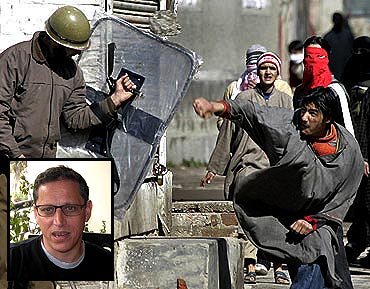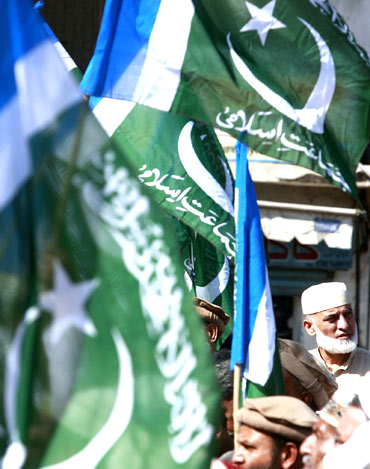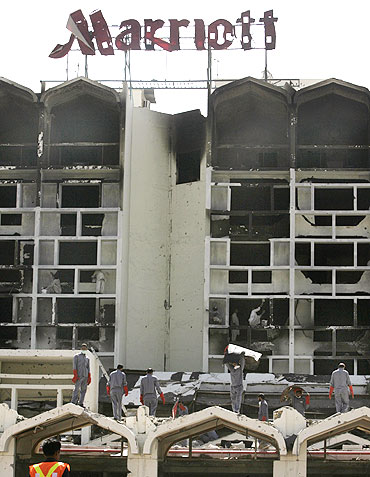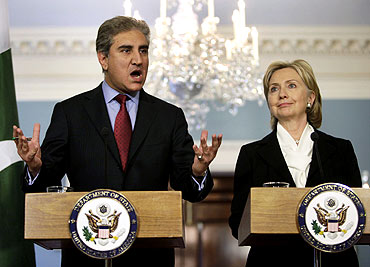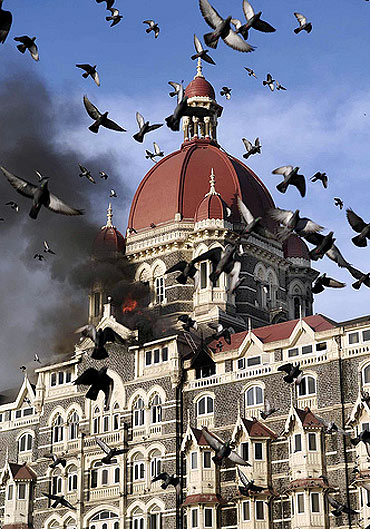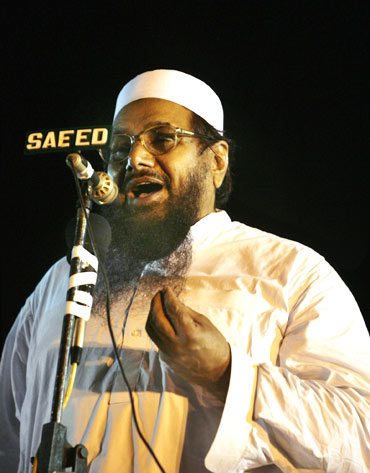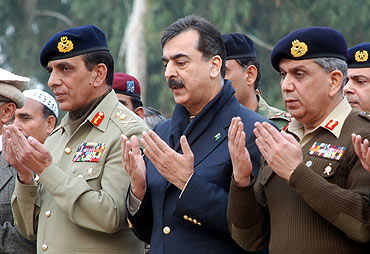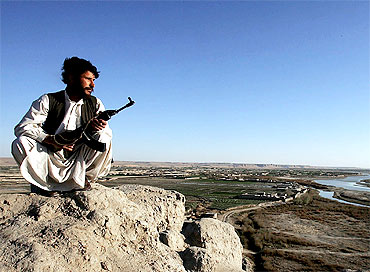 | « Back to article | Print this article |
'Everyone is afraid of discussing Kashmir publicly'
Levy worked as foreign correspondent for the London-based Sunday Times for seven years before joining the Guardian as senior correspondent. He has co-authored The Amber Room: The Fate of the World's Greatest Lost Treasure, and The Stone of Heaven: Unearthing the Secret History of Imperial Green Jade.
Currently, Levy and his co-author Catharine Scott-Clarke are travelling in India and Pakistan with an aim to pen two books -- one on Kashmir insurgency of the 90s and another on the ongoing changes within the Pakistani intelligence setup. Here is the concluding part of the interview with Levy.
Part 1: 'Changes within Pak are not visible from India'
You are in India when Kashmir is once again among headlines. Do you think the situation is heating up?
They are expressing much more Intifada (resistance) kind of rage against the security set up in Kashmir. They are reacting against over securitisation of Kashmir, resulting in stone pelting that is very difficult for India or for any country to deal with. This is dangerous. It is fire that is burning. It is tangible in the countryside. Obviously, India is surely aware of it.
Click on NEXT to continue reading...
'Pak is endlessly the victim of its own terrorism'
On the positive side, Kashmir has seen an increase in democratic practices like voter turnout, and a significant increase in tourism and economic growth. None of these issues deal with the greater issue.
What will happen if successful talks lead to full dialogue between India and Pakistan as Kashmir as an entity? Everyone is afraid of discussing it publicly because of the repercussions of placing Kashmir on the agenda.
Do you think Kashmir will soon be on the agenda of India-Pakistan talks?
I think the will is there on the Pakistan side to conduct it seriously. But, we will have to see whether or not they will be able to contain the forces that want to destabilise the talks. There are forces, which want permanent enmity between India and Pakistan; they want a war. There are powerful factions within the Inter Services Intelligence and the military. They have to play a strange ball, dancing with these factions to try and alleviate pressure and move ahead with India. This is the question. Can they do it successfully?
What is the short-term future of Indo-Pak bilateral relations?
Let us be frank. There is no relationship. It is in minus territory, now, after Mumbai (26/11). Everyone, of course, admires India for a self-restraint. We ourselves have suffered tremendously for years due to our domestic and foreign policy regarding Ireland and terrorism. I hate to say but Pakistan is endlessly the victim of its own terrorism. It is the civilians, who suffer the most.We were in Pakistan when the terrorist elements blew up the Islamic university; they plotted the bomb in cafeteria where girls were dining. Who are the victims in this? The victims were tremendously articulate teachers and students. A barely common interest arises unless it crosses the benchmark of 30 deaths.
Terrorism is so pervasive in Pakistan. There is an attempt at counter-intellectualism and counter-liberalism. They are countering the middle classes. Anyone who speaks against the bigots and extremists are becoming targets. Let us say that the experience of terrorism is deeply felt inside Pakistan in a way that sometime India doesn't tend to believe it.
'Terrorists want to destabilise both India and Pakistan'
Critics have said that India too has domestic extremists in the form of Maoists. India is trying hard to contain it. Pakistan can't keep asking for concessions and discounts when it is victim of its own policy and making. The issues are entirely different when these youth come to India, crossing the border. Critics have also said that Pakistan has to act because India is a victim of Islamic terrorism and Pakistan is victim of its misguided youth.
There is a difference. Within Pakistan there is home-grown indigenous terrorism with specific goals like Maoists in India have. It is not exported from outside.
What we see in Pakistan is that groups responsible for the Marriott hotel blast, attack on the (Sri Lankan) cricket team and other attacks in Peshawar are from same groupings, but from different cells. The same structure is mounting the Indian attacks. It is the same leadership, same financing and even the same logistics and training. Therefore, there is a common thread. The common thread is that terrorists want to destabilise Pakistan as well as India. It is not concerned with Kashmir being the theatre.
Precisely. Indians can claim that their attitude to terrorism if exported to any neighbourhood country would be different than Pakistan's
But, you have to separate the attitude of the government from the military. How did the government of Pakistan, fragile and weak, react to terrorism? After a 10-year gap when the civil government came to power it reacted by bringing in leading global law-enforcement agencies to build the capacity of its counter-terrorism force.
It is trying to create civilian counter terrorism forces (different than that managed by Pakistan military). It is trying to create a new homeland security apparatus. It is trying to push professionalism in police service. It is not that I am buying Pakistan's appeal. I believe all these are not necessarily working or effective. But, there is intent to understand and contain terrorism from the civilian bases.
'Pak today is not Cambodia of the Pol Pot era'
This was true during (Former Pakistan President Pervez) Musharraf's period. He allowed jihadis to grow in madrassas but had a double deal. He destabilised every form of civilian institution -- from elementary education to the civil services. Now, this is not Cambodia of the Pol Pot era. The civilian government is today trying to build up the forces to counter jihadis groups. Let us see what happens in the next three years.
You have stayed in both countries. What mistakes do you see in the Indian logic?
I think that the general belief is that a broad paintbrush won't work anymore. The finer details are needed -- micro understanding, with a shade of grey, is needed of India's differences with Pakistan.The old Indian view is that, 'the Pakistan's military-intelligence thinks that Afghanistan is the thorny edge and Kashmir is the slow punitive war to punish India'. The new view sees the way in which terrorism has destabilised Pakistan over the last decade.
Pakistan has been the biggest victim. It has been author of these policies but, now, they have realised that they have suffered far more than is evident. An element of the military now understands that they created an existential crisis for themselves when they saw the bonding together of extremists group of Punjab with the Pakistani Taliban and Al Qaeda.
The military realised that here was the perfect storm. It was no longer the Haqqani group that they could handle to prod India in Afghanistan. It was no longer the Hafeez Saeed network that they can use against India across the Line of Control to spill blood in Kashmir. These groups do not operate unilaterally but globally.
'Pak army chief was briefly grabbed by terrorists'
A straight question -- Do you think that any element of Pakistan's establishment was not involved in 26/11 at all?
(Pauses) From the outside, it is tempting to -- my gut reaction will be -- of course the elements of Pakistani establishment were involved. I watched on television in horror thinking about the training that must have been involved for this kind of a operation -- logistics, communication skills, weaponry, explosives and tactics that come with a flavour of State's involvement.Everyone suspects that there must be involvement of some elements within the military-intelligence establishment since they maintain such close proximity (to extremists groups).
But, on other hand, when I saw the attack on the Rawalpindi Army General Headquarters and also against a mosque there, they used commando equipment -- they scaled the walls; they had scaled maps of the mosque's exits. The planning was so meticulous that it killed hundreds of people; it was an exceptional operation. The actual goal of the attack was the abduction and kidnapping of the chief of the army staff (Army chief Ashfaq Pervez Kiyani). He was briefly grabbed and a brigadier gave up his life in exchange to spare the humiliation of the chief of army staff being abducted. Kiyani was there but they kept quiet about it.
There are elements within the military and the ISI, who are worried about a shade of progressive element in their organisations. I am mentioning this because there is an element of internal planning, which is also destabilising Pakistan. Make no mistake. They tried to destabilise the military at the highest level. We see the same elements present in Mumbai. Does it mean that when the Prime Minister and President have a briefing, do they say let us give it to them (terrorists)? Do these talks come out in that manner? The pressure of Lashkar-e-Tayiba works (only) with friendly elements within ISI.
'Pak has been forced to take 4 steps forward and 5 back'
What stops Pakistan from taking more action in the 26/11 case?
It is fraught with danger. Every policy has forced them to take four steps forward and five back. They have identified a whole group of people, who they feel are undoubtedly involved (in the Mumbai attacks). Some of them are unapproachable. They are out of bounds. They are so well protected by other elements of the State.
I think the civilian government is learning the boundaries of power. They are pushing up that boundary. They are getting more control on apparatus of the State. This can be only in India's interest.
Do you see any possibility of Pakistan's military having enough strategic reason to change their attitude towards India?
I think there are elements within the military, who have already begun changing their attitude. They do believe that a new approach is necessary to bring stability and prosperity within Pakistan.
There is a massive internal debate within the Pakistan military, which is not easy to see. The ones from 1970 -- the East Bangladeshis and people who grew up out of the Zai-ul Haque generation -- still carry a huge weight within the military. But they are divided between who are more conservatively Islamic and hate India and those who believe that the national security plan has to incorporate friendship with India.
(They must talk) For prosperity of both nations; it will come with guaranteed peace. If that seems naive, at least there will be a sense of building trust. Equally important is to find a global mechanism to counter-terrorism in Pakistan and India. We need to counter the impact of the same terrorism as it's exported to US and Europe. This requires global solutions and it requires India sitting at the table. Both should have access to human intelligence and technological resources, and should have political confidence. Pakistan has begun to show some sign of intelligence sharing with the European and US powers. The same can be done with India. That can be profitable to India.
Then, of course, there is much more beyond the regional sense. Pakistan's sense of self is so distorted by the concerns of India. It (India) is too much distraction.
There are so many pressing social and economic issues in the region. They have to be funded and followed through without which everything that is happening now will be meaningless. India often does not see how it is perceived from outside. It feels slighted too quickly; its skin is too thin. From outside, India seems to be surging bringing a huge amount of economic, social and entrepreneurial power. Nobody is underestimating India. People see a great amount of energy here.
'It is self-evident that there will be more attacks'
Do you see any third party mediation between Pakistan and India over Kashmir?
This is a great myth that there was never mediation over Kashmir. There was always private mediation. The talk of China mediating is just propaganda from both sides. It is irrelevant. But other powers -- be it UK, US or others -- bring different forums to different audiences and different opportunities in a very informal and quiet way.
Many in India believe there is no use talking to a civilian government. If and when possible, it is better to talk to the army who wield real power
I think precisely the opposite. We should all allow level playing field empowering all civilian structures in Pakistan. It is an age-old problem in Pakistan. Over the years, during the military power when the funding came in, it went into buying weaponry to attack India.
Now, we have a chance. The military has reached a stage where it becomes unpopular if empowered. The Pakistani middle class is more powerful; they won't accept it. So, the military is happy to take a back seat. We should encourage civil administration and see that the money is redirected to civil reforms and not into coffers that seek to create anti-India warfare. Today, more and more US funding is provided to civilian institutions. This will benefit India. A strong, articulate and well-functioning Pakistan government with good global friends will be ultimately good for the region.
Do you agree with the view that any more serious attacks like 26/11 would trigger tensions between the two countries?
It is self-evident that there will be more attacks. The probabilities are high and the impact will be enormous. The important thing is understanding how it happened? There are outstanding problems between the two countries. There is a network of organised criminals, whose members are part of the terrorist nexus. India wants them extradited. This adds to the tension.The problem is they are beyond the access of Pakistan's civilian government. They exist in the 'never world' to which we have no access to. I saw a picture of Dawood Ibrahim sitting on the lawns in Pakistan. I am sure it was a real picture. This has to be part of the longer programme of confidence building. I foresee much more tension. But, let us not get away from the fact that this is not the State-controlled terror of the kind, which we saw in Libya, in Iraq and in a lesser way in Iran. It is a different kind of terror, much more complex.
'Bad Taliban, good Taliban a reality'
How do you read the mindset of the current lot of terrorists?
I think they are in period of flux. The Pakistani Taliban is weak. They are suffering from leadership crisis and attempts to disrupt their funding network have been successful. Some other elements are strong. Look at Punjab and Bahawalpur.
In South Punjab, they are flourishing. They are as angry as ever and these groups are huge threats. The leadership of the Punjabi groups are evolving like Al Qaeda's elements and tying up with the rich Arabs with pan-Arabic-Islamist views. They are influencing the minds of Punjabi youth, which we should be very worried about.
If the US withdraws from Afghanistan, will these groups calm down?
I think it is inevitable. It will help. It won't be the solution because they will find a new course. I think the Taliban is full of inward-looking Afghans. The Taliban does not have global goals. It was said one would see an influx in Kashmir. But it is not proven so. The Taliban's aim is Afghanistan. They don't care about the Khilafat (establishing the authority of Allah on earth).
Do you support the theory of bad Taliban and good Taliban?
Absolutely. That is the only way forward. There are so many shades of militants. India is against such distinction. India believes that a Taliban government in Kabul will be favourable to Islamabad. Let us face it. It will be the reality in Kabul when Taliban elements of different shades would be inducted into the government.